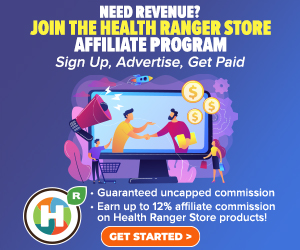
Surprising Facts and Symptoms About Attention Deficit Disorder
Wednesday, September 17, 2008 by: Kevin Gianni
Tags: attention deficit disorder, health news, Natural News
- TAKE IT DOWN Act advances in Congress amid free speech concerns
- Hospital staffers sound alarm after 10 nurses were diagnosed with BRAIN TUMORS
- Analysis: The coming economic collapse, a mass uprising and Trump's three secret weapons to halt the growing revolt
- Widespread social and economic unrest: Steve Quayle issues urgent financial warning of imminent asset collapse in new interview with Mike Adams
- Fauci is back in the limelight, and he’s busy promoting a future COVID or FLU pandemic
- Israeli lobbyists boast of controlling US national security policy in leaked AIPAC audio
- Mike Adams releases country western hit single: Goin’ Back in Time is Comin’ Home
- Tulsi Gabbard leads charge against the Biden regime’s global censorship of the 'Disinformation Dozen'
- Aerosolized bioweapons? Strange “diploid biomasses” falling out of the sky in Florida captured under the microscope
- Kiss Your Genetic Privacy Good-Bye! 23andMe Gets Green Light to Sell Your Intimate Genetic Details to Anyone They Want
- U.S. lawmakers investigate Meta over alleged China collaboration
- CLOT SHOT PLANDEMIC UNFOLDING: Fibrous, rubbery clots caused by covid injections have prion-like seeding activity
- New studies ignite debate: Fluoride linked to autism and ADHD, prompting calls for policy reassessment
- Children’s Health Defense stands firm: Based on SCIENCE and personal experiences, the MMR vaccine is NEITHER SAFE nor EFFECTIVE
- Defunding DEADLY mRNA jabs: Government funding for mRNA technology being scrutinized and sidelined until proven "safe and effective" for real
- Sen. Ron Johnson accuses CDC official in charge of COVID-19 injections of deleting records amid Congressional GOP scrutiny
- DEATH by VACCINE or face PRISON time: Canadian Freedom Convoy leaders CONVICTED for protesting forced vaccination during the Covid Plandemic
- Shedding light on the dark side of MMR vaccines: How vaccinated individuals SPREAD MEASLES & put the vulnerable at risk
- Fauci is back in the limelight, and he’s busy promoting a future COVID or FLU pandemic
- Tulsi Gabbard leads charge against the Biden regime’s global censorship of the 'Disinformation Dozen'
- Aerosolized bioweapons? Strange “diploid biomasses” falling out of the sky in Florida captured under the microscope
- Analysis: The coming economic collapse, a mass uprising and Trump's three secret weapons to halt the growing revolt
- Kiss Your Genetic Privacy Good-Bye! 23andMe Gets Green Light to Sell Your Intimate Genetic Details to Anyone They Want
- Widespread social and economic unrest: Steve Quayle issues urgent financial warning of imminent asset collapse in new interview with Mike Adams
- U.S. lawmakers investigate Meta over alleged China collaboration
- Mike Adams releases country western hit single: Goin’ Back in Time is Comin’ Home
- Chemtrails unveiled: How the CIA and Big Business are manipulating the weather for profit
- Curcumin’s ancient healing power supercharges muscle recovery, and its effects are compounded with anti-inflammatory foods and supplements
- Tulsi Gabbard takes aim at censorship: Justice for the ‘Disinformation Dozen’
- China’s counter-tariff strategies: A new chapter in the U.S.-China trade war
- CLOT SHOT PLANDEMIC UNFOLDING: Fibrous, rubbery clots caused by covid injections have prion-like seeding activity
- Israeli lobbyists boast of controlling US national security policy in leaked AIPAC audio
- European Court of Justice: Healthcare professionals who promoted or administered COVID-19 vaccines are CRIMINALLY LIABLE for any harm caused
- Defunding DEADLY mRNA jabs: Government funding for mRNA technology being scrutinized and sidelined until proven "safe and effective" for real
- DEATH by VACCINE or face PRISON time: Canadian Freedom Convoy leaders CONVICTED for protesting forced vaccination during the Covid Plandemic
- U.S. approves new Russian ambassador as diplomatic thaw continues
- Newly released JFK files reveal Pentagon's role in creating Lyme disease and covid in the same lab
- Analysis: The coming economic collapse, a mass uprising and Trump's three secret weapons to halt the growing revolt
- Mike Adams releases country western hit single: Goin’ Back in Time is Comin’ Home
- Aerosolized bioweapons? Strange “diploid biomasses” falling out of the sky in Florida captured under the microscope
- Kiss Your Genetic Privacy Good-Bye! 23andMe Gets Green Light to Sell Your Intimate Genetic Details to Anyone They Want
- European Court of Justice: Healthcare professionals who promoted or administered COVID-19 vaccines are CRIMINALLY LIABLE for any harm caused
- Federal employees whine over DOGE's new directive requiring them to do a 5-point summary of weekly accomplishments
- Dr. Mike Yeadon releases 15-minute testimony - WATCH - about genocidal intent of COVID “vaccines”
- The Health Ranger releases “Vaccine Zombie” song and music video, using AI-animated zombies for the music video
- U.S. approves new Russian ambassador as diplomatic thaw continues
- Government waste exposed: Hegseth supports Musk’s demand for accountability from federal workers
- Trump reverses course on Gaza plan, says “nobody is expelling Palestinians”
- Now you can HEAR chemistry: Health Ranger translates molecules into music in stunning video demonstration that will blow your mind (and your ears)
- 5 Simple steps to boost your brainpower: How to strengthen executive function in a distracted world
- EPA advisor admits the agency is funneling billions to climate groups ahead of Trump’s return to White House
- A lack of integrity in Academia: Harvard professor found GUILTY of fraudulent research to promote CRT theory
- Rep. Nancy Mace introduces bill to ban biological males from female facilities on federal property
- Survival 101: Effective EMF blocking techniques
- Red Cross issues warning to stop blood plasma donations from vaccinated people
- Scientists confirm: GENIUS brain function can be spontaneously unleashed in humans without any apparent cause
- EPA advisor admits the agency is funneling billions to climate groups ahead of Trump’s return to White House
- HYSSOP: What research reveals about the health benefits of this ancient holy herb
- Two containers with completed ballots fall out of truck in Florida
- Newly released JFK files reveal Pentagon's role in creating Lyme disease and covid in the same lab
- Global leaders unite to clamp down on “misinformation” with UN-backed Cascais Declaration
- BREAKING: 2025 NDAA authorizes mandatory military draft of WOMEN across America… as Pentagon pursues global NUCLEAR war with both Russia and China at the same time
- Michael Yon warns of a ZIONIST TAKEOVER in Trump’s second administration
- Mike Adams releases country western hit single: Goin’ Back in Time is Comin’ Home
- Ozempic and Wegovy weight loss drugs are injectable LIZARD VENOM PEPTIDES that may unleash a devastating wave of organ failure… side effects align with symptoms of SNAKE BITES
- The Health Ranger releases “Vaccine Zombie” song and music video, using AI-animated zombies for the music video
- BOMBSHELL: DNA testing kits are a SCAM to develop ethnic-specific bioweapons
- Israeli soldiers accused of even more torture and abuse in the West Bank
- These 13 countries just signed an agreement to engineer a global FAMINE by destroying food supply
- NASA admits that climate change occurs because of changes in Earth’s solar orbit, and NOT because of SUVs and fossil fuels
- RFK Jr. clears key hurdle: Sen. Susan Collins backs controversial HHS nominee, signaling a new era for health policy
- Sermon 30: How Jesus reveals Caesar’s FAKE CURRENCY and FALSE AUTHORITY
The Fountain of Youth World Summit with Tellman Knudson, an NOP expert hypnotist with a personal and professional interest in ADD and the founder of Instant ADD Success.
Kevin: I'm going to get right into this so why don't you start with just a little bit about your story, your background and how we are here on this call now.
Tellman: Sure, well, it's pretty interesting. Basically what it comes down to is -- in college I was studying peak performance in athletes. I wanted to be a better distance runner. I went to a school where I could actually work on creating my own major. This Marlborough College was a fantastic place but while I was there, I started studying brain waves, ultra fits of awareness, alpha, beta, theta, delta, the whole thing and I stumbled upon self hypnosis first and what was happening as I was reading some books, doing some research, I said "Wow! This looks like a pretty cool technique, let me try it". As I said, I was running data consistently, day after day after day. All of a sudden 95 percent of the time I would go out running, I would be running at absolute peak levels and it was just an amazing experience.
What ended up happening was, I'm out there on a two and a half hour run, going full board the whole time and feeling like a powerhouse and I said, "Gees! Why can't I just do this when I am trying to complete a paper"? [laughter] I was diagnosed with ADD when I was really young; you know, it was very frustrating. Learning and schooling is very challenging for me. So, I went back and finished that run and I sat down and tried to read a book. And sure enough after about 10 minutes, my mind was wondering and my eyes were scanning over the page but not a single word was actually being absorbed by my brain. I said; "Oh! There it is again. You know what -- let me try that technique I was working on while I was running". And I mentally walked through the exact same technique and sure enough my brain clicked on and I read that book from cover to cover and I remembered the entire thing. I don't claim to have a photographic memory, but it was the best reading experience I had ever had in my entire life and I said, "Wow! Maybe there is something to this".
I ended up continuing to apply and adopt hypnosis and self-hypnosis techniques to my mind because I knew that there must be a way to use my brain effectively because I had proven it to myself in terms of training and mental training as an athlete. So I actually got obsessed with the mind and what it could accomplish specifically as it related to Attention Deficit Disorder. And I went through this incredible journey where I started studying hypnosis and I ended up becoming a certified hypno-therapist, I got trained in NLP (Neural Linguistic Programming), and that's what I ended up focusing on in school with all my research, then I went on to start six hypnotherapy businesses, really focused on helping people with Attention Deficit Disorder to use attention deficit as a strength to accomplish whatever it is they wanted to in their lives.
Kevin: Well, let's talk about Attention Deficit Disorder and how people are first diagnosed, what goes through their minds and then we'll take this up through how you can become a success with it.
Tellman: Well, first of all, for a lot of people it comes before diagnosis. Right! Whether they are an adult or whether they are a kid, they suspect they have ADD and so often times they go in and they get tested.
Kevin: Um.
Tellman: Now, it's important to realize that I am not a doctor, I cannot diagnose anyone with ADD, nor would I want to. When people are thinking about ADD they are thinking, "Oh no! If I have ADD I'm totally screwed". [laughter] "I am in a terrible situation, my life is going to be a mess and I'm not going to be able to get a job, I'm not going to be able to graduate from school and I'm not going to be able to do X, Y Z, 1, 2, 3" -- over and over and over again. What I would really recommend, whether you suspect you have ADD, whether you know you have ADD, it's almost irrelevant and here is why. Almost everyone on the face of the earth has ADD symptoms. That's just the deal. Everyone is born with ADD symptoms. The real question is; how many symptoms do you have? To be diagnosed basically just means you have a checklist and you are going down the checklist and the doctor is asking you a bunch of questions and they check off a certain number of boxes, and if you have a certain percentage of boxes that are checked, ooh! You are diagnosed with ADD.
Kevin: It's really that simple?
Tellman: It really is and you know it could be that day, it could be how much coffee you had before, it could be whether you are stressed out that day, it could make all the difference. So, it doesn't matter whether you are diagnosed or not, the real question you have to ask yourself is, "Look, do you have problems focusing?" If you do, we have good news because we can teach you how to use the brain you already have to go out and kick some serious success butt. [laughter] Again the real question isn't whether or not you have ADD. The question is, how are you going to use your existing brain in order to achieve what you want to achieve. Does that make sense?
Kevin: Absolutely. What do you start doing? What is the first step for someone who realizes that they are going crazy because things are firing them up all the time and they just can't seem to get their head around anything.
Tellman: The first thing that I would say is there is a very distinct difference between what we call multi-tasking and being easily distracted. OK. There is a very distinct difference but it is extraordinarily subtle if you don't know what to look for. If you do know what to look for, it is easier to spot. If you don't, you are in the dark. So here is how it works: what I would ask you is when you are easily distracted, you are going from thing - to thing - to thing – to thing – to thing. Right!
Kevin: Um.
Tellman: And everyone has felt easily distracted at points in their lives. So what I would ask you is; when you're feeling easily distracted are you accomplishing much? Most people would say no! And here is why; you are going from random thing - to random thing - to random thing - to random thing. Right! That is being easily distracted. And we all have this, whether we are talking about trying to accomplish something very specific in our life or whether we are talking about being highly effective, if we are not able to take those distractions and use them to accomplish something, we probably won't get much done. On the other hand, one of the most prized skills that we are looking for today, OK, in jobs especially with technology, is the ability to multi-task. As a matter of fact, there are many, many, many jobs that are out there where employers look for people with ADD. They actually seek them out because they excel in certain types of job positions. We'll tell you more about that later. Before we do, I'd like to share with you the one concept, the one principal that makes all the difference. See, people who are really good in multi-tasking also go from thing - to thing - to thing – to thing.
Kevin: Um.
Tellman: So what is the difference? Well, I call it the umbrella principle. And the umbrella principle has to do with the types of distractions that you have. Now let me explain. If you group or categorize on purpose the different types of distractions or the different type of things you are working with on a given day, ok, into a series, then what can happen is you can still go from thing – to thing – to thing – to thing – to thing, but you are making a forward motion with each one of those things to accomplish one goal. That is what I call Intentional Distraction. So when you are intentionally distracting yourself from thing – to thing – to thing – to thing, before you get randomly distracted you make massive progress, massive progress. And here is one more principle, one more technique; most people with ADD respond to pressure, specifically time or deadline pressure, extremely, extremely well. Not all, most.
Kevin: Interesting.
Tellman: OK. Nothing we are talking about here today is universally applicable. Ok. Anyone that tells you they have a success principle, a success idea that can be applied effectively in every situation, it's just not true, people are different. Right! So the question then mainly comes on: "how can I succeed?" Again, very, very, very simple. If you line up a bunch of distractions that will move you toward that one goal you are trying to achieve and you put time pressure on each one of the tasks that you are working on in a very specific amount of time, I'll explain how you do this in a minute, you'll get ten times more done than any of your linear thinking counterparts. By the way, you probably think linear people are fairly boring if you have a lot of ADD tendencies. Ok. Boring, boring, boring. Now this is the key. Right! It's been said that as many as 80 percent of the people in prison today are diagnosable as having ADD.
Kevin: Wow.
Tellman: That's a lot of people with ADD under one roof.
Kevin: Wow.
Tellman: But if you start thinking about it, that makes sense. They like to take risks, they don't like to follow the rules. Right! They like to do things on their own schedule and in their own way without anybody telling them what to do. Probably they aren't quite good at holding their own jobs.
Kevin: Sounds like I should be in prison. [laughs]
Tellman: Actually this is a really important point. It's also been said that as many as 80 percent of entrepreneurs are diagnosable with ADD.
Kevin: Gotcha!
Tellman: They like to do their own thing, they don't like to follow the rules, they like to take risks, Ok. There is only one difference between the people in prison and the people who are entrepreneurs out there. And it's not that they didn't get caught. [laughter]
Tellman: It's making a choice. Very similar to the type of choice you have to make with intentional distraction. The choice is this -- are you going to do it legally or not? Because you get just as much of a rush out of putting together an entrepreneurial venture that makes you a million dollars as you can from going out and selling a bunch of cocaine on the street and hoping you don't get caught by the police. [laughter]
Kevin: Right:
Tellman: It's just as exciting because you know you are not going to get into trouble if you win.
To read the rest of this transcript as well as access more information by health experts on abundance, optimum health, and longevity just like Tellman Knudson, please visit (http://fountainofyouthworldsummit.com) .
About the author
Kevin Gianni is a health advocate, author and speaker. He has helped thousands of people in over 85 countries learn how to take control of their health--and keep it. To view his popular internet TV Show "The Renegade Health Show" (and get a free gift!) with commentary on natural health issues, vegan and raw food diets, holistic nutrition and more click here.His book, "The Busy Person's Fitness Solution," is a step-by-step guide to optimum health for the time and energy-strapped. To find out more about abundance, optimum health and self motivation click here... or you're interested in the vegan and raw food diet and cutting edge holistic nutrition click here. For access to free interviews, downloads and a complete bodyweight exercise archive visit www.LiveAwesome.com.
Attention deficit disorder at FETCH.news
Get independent news alerts on natural cures, food lab tests, cannabis medicine, science, robotics, drones, privacy and more.
Take Action: Support Natural News by linking to this article from your website
Permalink to this article:
Embed article link: (copy HTML code below):
Reprinting this article:
Non-commercial use OK, cite NaturalNews.com with clickable link.
Follow Natural News on Facebook, Twitter, Google Plus, and Pinterest
Science News & Studies
Medicine News and Information
Food News & Studies
Health News & Studies
Herbs News & Information
Pollution News & Studies
Cancer News & Studies
Climate News & Studies
Survival News & Information
Gear News & Information
News covering technology, stocks, hackers, and more



"Big Tech and mainstream media are constantly trying to silence the independent voices that dare to bring you the truth about toxic food ingredients, dangerous medications and the failed, fraudulent science of the profit-driven medical establishment.
Email is one of the best ways to make sure you stay informed, without the censorship of the tech giants (Google, Apple, Facebook, Twitter, YouTube, etc.). Stay informed and you'll even likely learn information that may help save your own life."
–The Health Ranger, Mike Adams












































